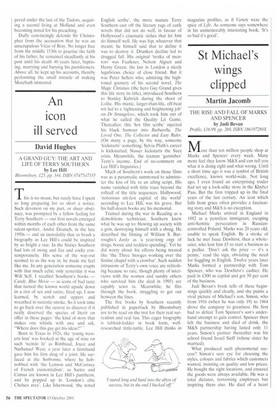An icon ill served
David Hughes
A GRAND GUY: THE ART AND LIFE OF TERRY SOUTHERN by Lee Hill Bloomsbuty, 125. pp, 344, ISBN 0747547335 This is no moan, hut rarely have I spent so long preparing for so short a notice. Such devotion on my part, or sheer obstinacy, was prompted by a fellow feeling for Terry Southern — our first novels emerged within months of each other from the same talent-spotter, Andre Deutsch, in the late 1950s — and an incredulity that so brash a biography as Lee Hill's could be inspired by so bright a star. In the Sixties Southern had lots of swing and fizz and cocky contemporaneity. His sense of the way-out seemed to us the way in; he made me feel like me. In any generation someone erupts with that much eclat; only yesterday it was Will Self. I recalled Southern's books — Candy, Blue Movie — as icons of bad taste that turned the known world upside down in a riot of sex and satire, fired up, I now learned, by scotch and uppers and wreathed in narcotic smoke. So it took time to go back over the oeuvre to discover if it really deserved the species of litcrit on offer in these pages: 'the kind of story that makes one whistle with awe and ask, "Where does this guy get his ideas?" ' Born in Texas in 1924, the 'young western lout. was hooked at the age of nine on such 'weirdo !it' as Rimbaud, Joyce and Nathanael West; a year later a farmhand gave him his first drag of a joint. He surfaced at the Sorbonne, where he hobnobbed with 'the Lennon and McCartney of French existentialism', as Sartre and Camus are known in Lee Hill's pantheon, and he popped up in 'London's chic Chelsea area'. Like Isherwood, 'the noted English scribe', the more mature Terry Southern cast off the literary rags of early novels that did not do well, in favour of Hollywood's cinematic riches that let him do himself well. He was hip, whatever that meant; he himself said that to define it was to destroy it. Drunken decline led to drugged fall. His original 'troika of mentors' was Faulkner, Nelson Algren and Henry Green, the last in London a nicely lugubrious choice of close friend, But it was Peter Sellers who, admiring the hightoned goonery of his second novel, The Magic Christian (the hero Guy Grand gives this life story its title), introduced Southern to Stanley Kubrick during the shoot of Lolita. His manic, larger-than-life, off-beat wit led to a 'tightening and brightening job' on Dr Strangelove, which took him out of what he called the Quality Lit Game. Thereafter, this 'hot film scribe' injected his black humour into Barbarella, The Loved One, The Collector and Easy Rider. (On many a page, by the way, someone `kickstarts' something; Sylvia Plath's career is kickstarted; Nasser kickstarts the Suez crisis. Meanwhile, the taxman 'garnishes' Terry's income. End of no-comment on Lee Hill's linguistics,)
Much of Southern's work on those films was as a paramedic summoned to administer the kiss of life to an ailing script. His name vanished with little trace beyond the 'oilcan of the title sequences. Hollywood, 'notorious sin-fest capital of the world' according to Lee Hill, was his grave. But his half-dozen books are his memorial.
Trained during the war in Reading as a demolitions technician, Southern knew what he was up to: blowing up society with a grin, destroying himself with a shrug. He described the filming of William S. Burroughs's Junky as 'a year-long orgy of drugs, booze and reckless spending'. Yet he did worry about his efforts being treated like 'the Three Stooges working over the Sistine chapel with a crowbar'. Such sudden intrusions of Terry's own voice are refreshing because so rare, though plenty of interviews with the women and sundry others who survived him (he died in 1995) are capably sewn in. Meanwhile, he flits through the book, struggling to get out between the lines.
The five books by Southern recently published in paperback by Bloomsbury are to be read on the trot for their real surrealism and real fun. This eager biography is tabloid-fodder in book form, wellresearched tittle-tattle. Lee Hill thinks in magazine profiles, as if Variety were the spice of Life. As someone says somewhere in his unmemorably interesting book, 'It's so bad it's good'.


























































































 Previous page
Previous page